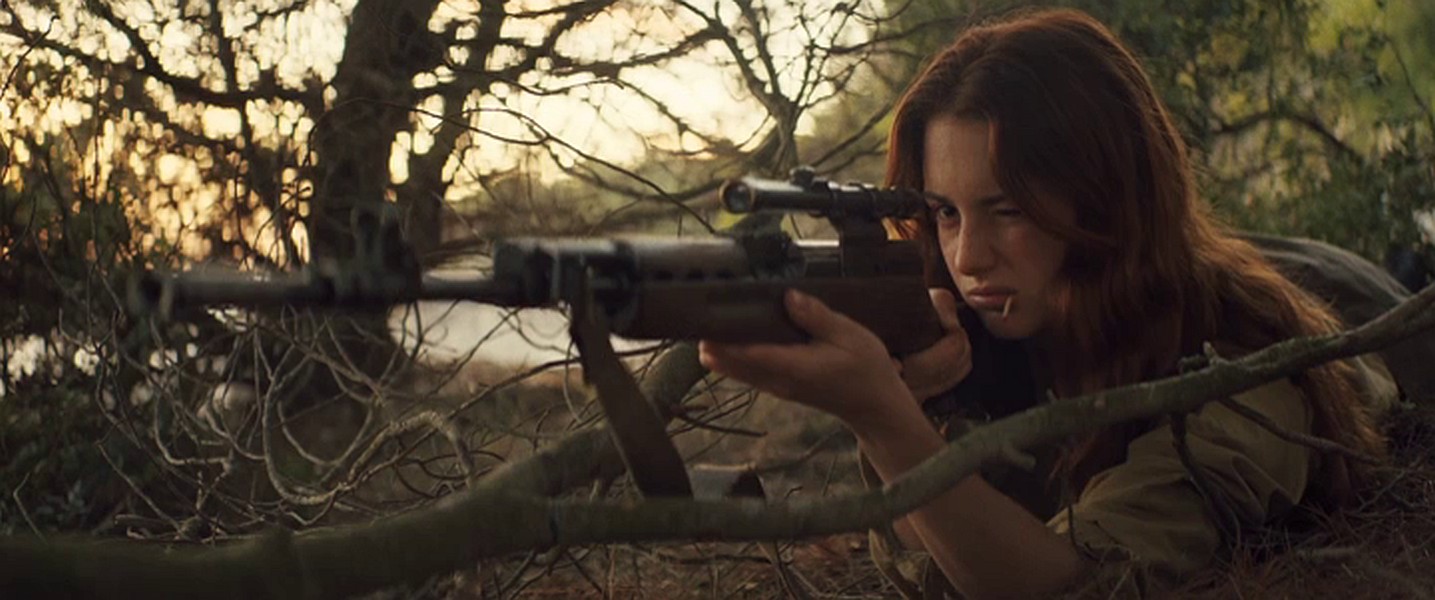★★½
“The family that slays together, stays together.”
 A Netflix original movie, the first thing to say is: thankfully, this is not as bad as Interceptor. Mind you, few films with budgets measured in the millions are as bad as Interceptor. It did more damage to my perception of the Netflix brand than any other, to the point I was genuinely concerned about having to watch this, fearing it would be down at the same level. Certain elements are, most likely the script. But the presence of Alison Janney, single-handedly prevents the film from sinking, effectively acting as a life-belt for the less successful elements. It’s a shame the makers apparently didn’t realize what they had, and used the strength of its star better.
A Netflix original movie, the first thing to say is: thankfully, this is not as bad as Interceptor. Mind you, few films with budgets measured in the millions are as bad as Interceptor. It did more damage to my perception of the Netflix brand than any other, to the point I was genuinely concerned about having to watch this, fearing it would be down at the same level. Certain elements are, most likely the script. But the presence of Alison Janney, single-handedly prevents the film from sinking, effectively acting as a life-belt for the less successful elements. It’s a shame the makers apparently didn’t realize what they had, and used the strength of its star better.
She plays Lou, a near-retiree who lives quietly on an island near Seattle. She has a tenant, Hannah Dawson (Smollett), a single mother of Vee (Bateman). But Lou is ready to check out of life entirely. She has a gun pointed at her own head, when Hannah rushes in, begging for help, because her husband Philip (Marshall-Green) – supposedly dead – has shown up and kidnapped Vee, in the middle of a ferocious storm. Fortunately, Lou has a history, which has given her the ideal set of special skills for the circumstances. She and Hannah set out through the rain in pursuit of Philip. Yet there’s more going on, with Lou’s history catching up with her, as well as the truth about her relationship to Hannah and Philip.
The idea of Lou is a strong one, playing roughly along the lines of Liam Neeson in the Taken franchise, with a hint of John Wick. A grizzled veteran, who just wants to be left alone, who is dragged back into a life of violence: only, this time, it’s a woman, Lou being a CIA field agent, with 26 years experience, before leaving under murky circumstances. The rest of the story though? Oh, dear. The film staggers from ineptly-staged scenes of family bonding, to revelations that are more likely to provoke a snort of derision than a gasp of surprise. Lou vanishes entirely for much of the second half, and Hannah is simply not interesting enough to hold the movie together.
The action is fairly well-staged, though they don’t put enough effort into equalizing the fights. Lou’s opponents are all bigger and stronger than her, and there are times where the movie forgets this. However, Janney sells her persona so well, I was inclined to cut this the necessary slack. Director Foerster’s previous feature was Underworld: Blood Wars, and there’s a definite sense at the ending they want to turn this into a similar franchise. Despite the mediocre overall rating, there is plenty of potential in the lead character, and I would not be averse to more of her story. Let’s just hope they keep writers Maggie Cohn and Jack Stanley in a remote cabin on an island in the Pacific Northwest, and well away from any sequel’s script.
Dir: Anna Foerster
Star: Allison Janney, Jurnee Smollett, Logan Marshall-Green, Ridley Asha Bateman





 This feel like it could easily have come out of the nineties, with the distinct whiff of a throwback to the golden age of Hong Kong “girls with guns” movies. That is, of course, not a
This feel like it could easily have come out of the nineties, with the distinct whiff of a throwback to the golden age of Hong Kong “girls with guns” movies. That is, of course, not a  This one was probably teetering on the edge of a seal of approval, except one aspect. For what’s supposed to be book one in a series, the author spends a lot of time discussing events prior to the book getting under way, such as the tragic loss of the heroine’s true love. However, subsequent research revealed that this is not the start of Caina Amalas’s history. The Ghost Exile series is actually a sub-set of her saga, which appears to consist of no less than 26 primary works. According to
This one was probably teetering on the edge of a seal of approval, except one aspect. For what’s supposed to be book one in a series, the author spends a lot of time discussing events prior to the book getting under way, such as the tragic loss of the heroine’s true love. However, subsequent research revealed that this is not the start of Caina Amalas’s history. The Ghost Exile series is actually a sub-set of her saga, which appears to consist of no less than 26 primary works. According to  When I reviewed Russian fencing film
When I reviewed Russian fencing film  I was pleasantly surprised when this random kung-fu film found Tubi (under the Silver Fox title) turned out to be by the creator of
I was pleasantly surprised when this random kung-fu film found Tubi (under the Silver Fox title) turned out to be by the creator of  This is another one in the apparently endless series of low-budget urban movies, which focus on crime in the black community. Though this does actually have a couple of wrinkles which make it stand out, if not quite enough to make it a success for a wider audience outside its community. Columbus, Ohio is the setting, where Princess (Godsey) is struggling to make ends meet. She’s relying on handouts from her dodgy brother, Dae Dae, to make rent, and also wants to get her best friend away from her pimp. Opportunity comes knocking, in the shape of an Uber driver, Omar (Campbell), who brings her on board in his business, which he tells her has almost unlimited upside and growth potential.
This is another one in the apparently endless series of low-budget urban movies, which focus on crime in the black community. Though this does actually have a couple of wrinkles which make it stand out, if not quite enough to make it a success for a wider audience outside its community. Columbus, Ohio is the setting, where Princess (Godsey) is struggling to make ends meet. She’s relying on handouts from her dodgy brother, Dae Dae, to make rent, and also wants to get her best friend away from her pimp. Opportunity comes knocking, in the shape of an Uber driver, Omar (Campbell), who brings her on board in his business, which he tells her has almost unlimited upside and growth potential. ★★½
★★½ After the success of Bloody Mama, producer Roger Corman wanted to follow up with another film depicting lawlessness in the Depression. He found his source material in Sister of the Road, supposedly the autobiography of a thirties drifter called Boxcar Bertha. No such one person actually existed: it was assembled by the author, Dr. Ben L. Reitman, from multiple characters he met while helping women in trouble in Chicago (a fictionalized version of the doctor may appear in the movie). Corman hired the then almost unknown Martin Scorsese, who was directing his first commercial film; its predecessor, Who’s That Knocking at My Door, grossed only $16,085. Scorsese was given a schedule of 24 days and a budget of $600,000.
After the success of Bloody Mama, producer Roger Corman wanted to follow up with another film depicting lawlessness in the Depression. He found his source material in Sister of the Road, supposedly the autobiography of a thirties drifter called Boxcar Bertha. No such one person actually existed: it was assembled by the author, Dr. Ben L. Reitman, from multiple characters he met while helping women in trouble in Chicago (a fictionalized version of the doctor may appear in the movie). Corman hired the then almost unknown Martin Scorsese, who was directing his first commercial film; its predecessor, Who’s That Knocking at My Door, grossed only $16,085. Scorsese was given a schedule of 24 days and a budget of $600,000. ★½
★½ I never considered myself to be afraid of heights. I respect them, sure. But I am capable of going up the ladder to change that annoying smoke alarm battery without a safety net. This film though, literally gave me sweaty palms. It’s about climber Becky Connor (Currey) who lost her husband Dan (Gooding) in a rockface accident a year before, and has spiralled down into alcoholism and depression since. Her father (Morgan) gets her best friend Shiloh Hunter (Gardner) to intervene, and she convinces Becky the best thing is to get back on horse, with a climb of a two thousand feet tall, abandoned TV mast.
I never considered myself to be afraid of heights. I respect them, sure. But I am capable of going up the ladder to change that annoying smoke alarm battery without a safety net. This film though, literally gave me sweaty palms. It’s about climber Becky Connor (Currey) who lost her husband Dan (Gooding) in a rockface accident a year before, and has spiralled down into alcoholism and depression since. Her father (Morgan) gets her best friend Shiloh Hunter (Gardner) to intervene, and she convinces Becky the best thing is to get back on horse, with a climb of a two thousand feet tall, abandoned TV mast.  The journey up is where the moist hands started. I don’t care how nice the views might be, I’m afraid it’s going to be a no from me, dawg. Adding to the fraught tension, is the focus by Mann on the decaying structure: rust, missing bolts and general creakiness. It’s like Final Destination: you know something is inevitably going to go terribly wrong, it’s just a question of when, and the specifics. It duly does, leaving the pair stranded near the top, on a platform about the size of our dining table, with no route down or way to call for help. The rest of the film is the struggle of Becky and Hunter (she uses her last name, or her social media identity of “Danger Deb”) to find a way to do one or the other.
The journey up is where the moist hands started. I don’t care how nice the views might be, I’m afraid it’s going to be a no from me, dawg. Adding to the fraught tension, is the focus by Mann on the decaying structure: rust, missing bolts and general creakiness. It’s like Final Destination: you know something is inevitably going to go terribly wrong, it’s just a question of when, and the specifics. It duly does, leaving the pair stranded near the top, on a platform about the size of our dining table, with no route down or way to call for help. The rest of the film is the struggle of Becky and Hunter (she uses her last name, or her social media identity of “Danger Deb”) to find a way to do one or the other.